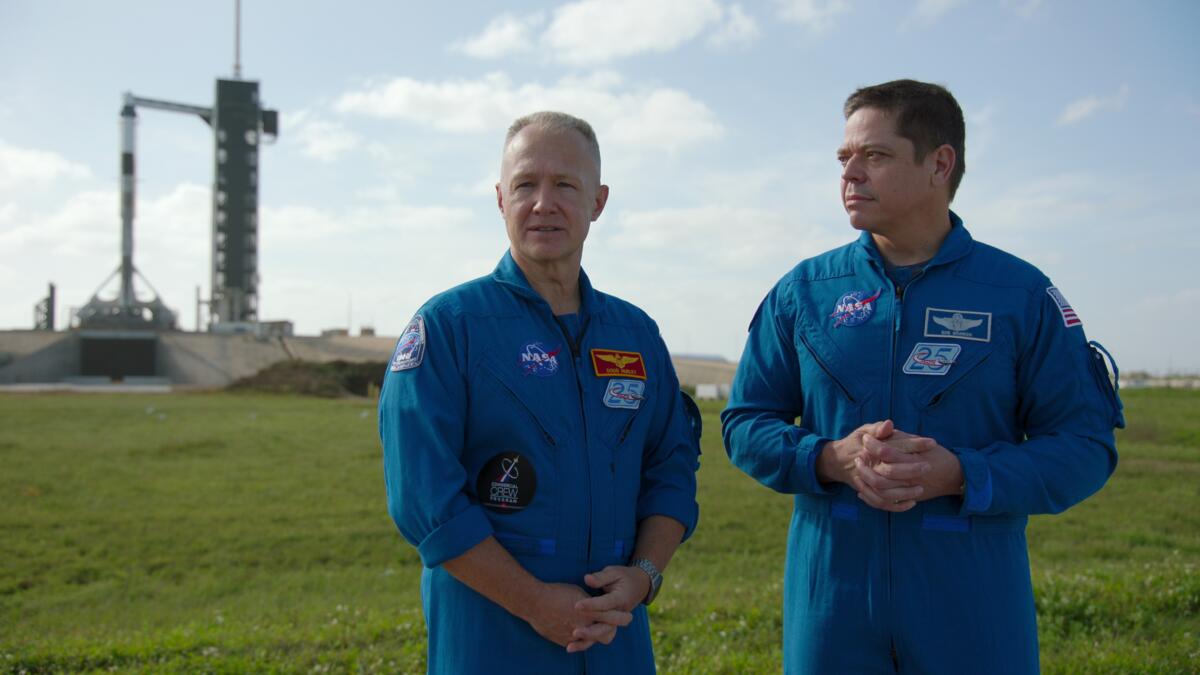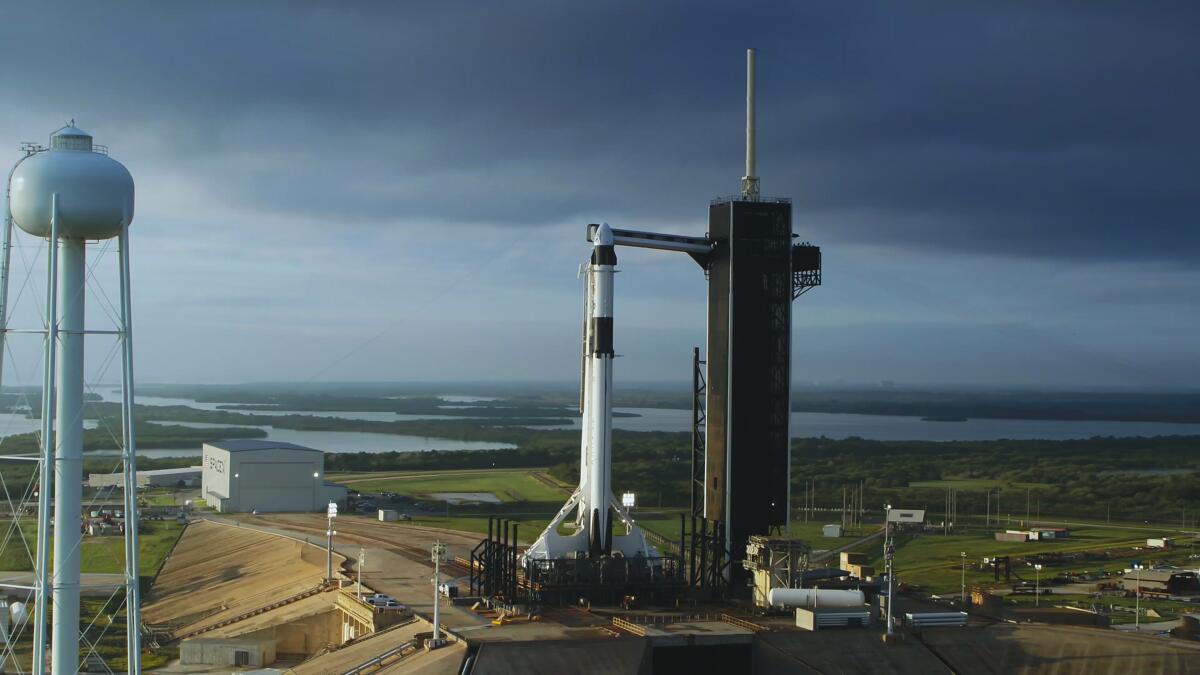Documentary ‘Return to Space’ wraps a thrilling adventure story in Elon Musk’s ego

- Share via
The space race used to be strictly between nations. Now it’s between rich dudes. At the time filmmakers Elizabeth Vasarhelyi and Jimmy Chin (“Free Solo”) were making their latest documentary, “Return to Space,” only four entities had successfully launched a space capsule into orbit and brought it back to Earth: the U.S., Russia, China and billionaire Elon Musk.
The starstruck entrepreneur’s groundbreaking company SpaceX and its simultaneously patient and impatient mission to get humans into orbit again are the focus of “Return to Space.” Boasting exclusive access to SpaceX’s 2020 launch of Demo-2 — the first crewed U.S. mission since NASA’s last Space Shuttle flight in 2011 — the film is a relatively smooth blend of optimism for a rejuvenated emphasis on human exploration in the beyond, and branded content promoting a controversial businessman.
Musk is certainly featured, but he doesn’t dominate. Early on, we see him sitting in the hangar of his rockets, pitching us on his interplanetary goals, and they’re expectedly a mix of wonderment, fearmongering, and ego — essentially, we can’t stay on Earth forever, something’s coming anyway (a meteor, climate change, World War III), and NASA didn’t move fast enough for him in getting to Mars.
It was probably inevitable that the private sector would get involved in space flight, but not necessarily that NASA’s shrinking ambitions and bureaucracy would necessitate it. The movie addresses the initial hubbub that the storied agency caused by announcing its partnership with companies like SpaceX — that Neil Armstrong chose to speak out against ceding NASA’s authority to the private sector was a particular blow to the hero-worshipping Musk.

But nothing tastes sweeter than success, and the efficiently told story of how SpaceX in league with NASA kept at it through plenty of trial-and-error launches and payload-only missions for nearly 20 years, until they were ready to send a pair of trained astronauts — Marine pilot Doug Hurley and engineer Bob Behnken — to the International Space Station, is a fairly thrilling one. The swiftness of Space X’s achievements in building reusable rockets, we’re told, came down mainly to the difference between the cautious approach to problem-solving of a taxpayer-funded operation like NASA, and the go-go-go mindset of a well-funded company eager to try out its tech and learn from expected failures.
The second half is devoted to the details surrounding the Demo-2 launch in Florida, which carried a more solemn air of safety first because it did involve humans. Though it’s reassuring to see the initially scheduled big day aborted when weather didn’t cooperate — even though Musk clearly thought they should go ahead — the filmmakers spend too much time on the nonlaunch when the movie is already packed with information and inching toward overlength.
There are nice human details, however, from the various superstitions in SpaceX employees, to the nerdy YouTuber breathlessly awaiting liftoff, to the fact that Hurley’s and Behnken’s wives — Karen Nyberg and Megan McArthur, respectively — are also both accomplished astronauts. At times, in the vérité scenes with the casually dressed, joshing ground control employees, the vibe is workplace sitcom, and when, upon Demo-2 reaching orbit, Behnken pulls out his son’s toy dinosaur and calls it a stowaway, it’s as if we’re being set up for the “regular people doing the extraordinary” feeling a commercial space company would want to project. (His space walk, however, during his time on the ISS, definitely looks like a job for a brave professional.)
Even as it leans toward infomercial, judiciously skirting the more problematic parts of Musk’s personality, there’s no denying that “Return to Space” — in keeping with the feats-of-wonder emphasis of Vasarhelyi’s and Chin’s previous work — chronicles an incredible achievement. The collaboration between a noble, reconfigured government program and a tech magnate’s market-hot space-dream factory, provides enough awe-inspiring moments to make one ready for the new age of universe exploration it’s championing. “Thanks for flying SpaceX!” we hear someone cheekily say to the astronauts after their successful splashdown. This ultra-positive movie is about hoping the rest of us say the same thing back, with an added a comma: “Thanks for flying, SpaceX!”
'Return to Space'
Running time: 2 hours, 6 minutes
Not rated
Playing: Available April 7 on Netflix
More to Read
Only good movies
Get the Indie Focus newsletter, Mark Olsen's weekly guide to the world of cinema.
You may occasionally receive promotional content from the Los Angeles Times.










